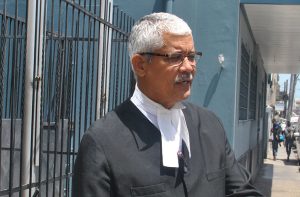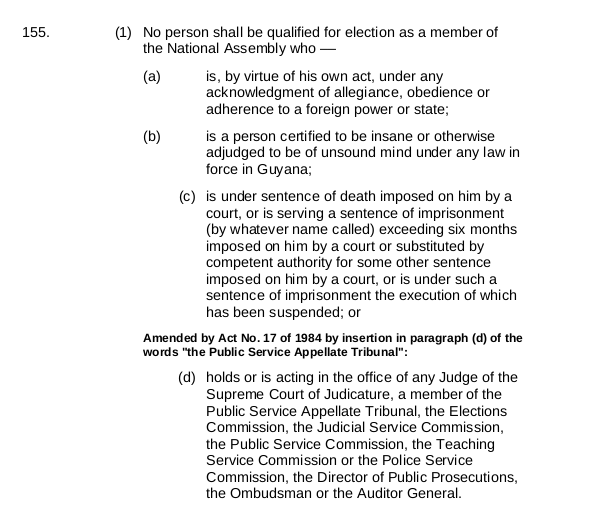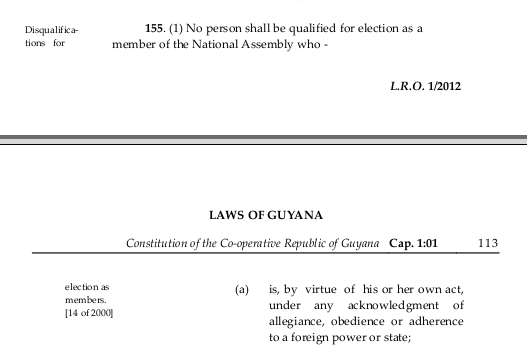‘Charrandass was a ‘usurper’

…CCJ told constitution contains strong anti-defection provisions
…Belizean SC says dual citizen Persaud ‘was never elected’ to House
By Svetlana Marshall in Port of Spain
BELIZEAN Senior Counsel, Eamon Courtenay told the Caribbean Court of Justice (CCJ), on Thursday, that Guyana’s Constitution is embedded with an ‘Anti-defection’ provision that prevents Members of Parliament from voting against the lists from which their names were extracted. He also called expelled MP, Charrandass Persaud, a ‘usurper’ owing to his dual citizenship status, contending that he was never an elected member of the House and that his vote should be rendered null and void.
The Senior Counsel, who is representing Attorney General Basil Williams, S.C in the consolidated appeals challenging the decision of the Court of Appeal to invalidate the Vote of No-Confidence Motion, made the comments in a courtroom filled with attorneys and Guyana’s ministers of Government.
Crossing the floor
Courtenay, in addressing the issue of ‘crossing the floor,’ on day one of the hearing into the no-confidence motion at the regional court, stated that: “The system in Guyana provides for an election of parties. Parties are given seats. There are lists submitted by the parties. The Constitution of Guyana, Article 156, says, if you intend to not support your list, you must make a declaration to the Speaker (of the National Assembly) in writing,” the Belizean Senior Counsel submitted to the court.
He asked the judges of Guyana’s highest court to consider the intent of Article 156 (A), and compare its requirements, with the action of Charrandass Persaud, who, while as a Government Member of Parliament, used his seat to vote against the Government and the list from which his name was extracted without issuing a declaration.
He said MPs are required to vote in favour of their party in keeping with policy decisions, in the case of Government, made at the level of Cabinet. He said once a member no longer supports a list, he must declare same to the Speaker or the Leader of the List in keeping with Article 156.
Is this system a charade or Government a rubber stamp? “No!” The Senior Counsel said as he responded to questions posed by the judges. “The debate, the differences take place in the Cabinet, in the political caucus. It is resolved by the party that has been elected by the country, to govern the country. They have that mandate, they are implementing. They have drawn up their motions, they have drawn up their acts and legislation, they debate it internally in Cabinet, they reshape it, they reform it, they go to the political caucus, if you have back benchers, you get them on board, argue about it, agree, then go to parliament and we implement,” he explained.
Imposter
In his more than one hour long oral submission, the Belizean Senior Counsel also shot down arguments made by PPP lawyer, Trinidadian Douglas Mendes, who upon representing the Leader of the Opposition Bharrat Jagdeo, told the Court that the Charrandass Persaud’s vote in the National Assembly was saved by the De Facto Doctrine, though he was a dual citizen in the House, in total breach of the Constitution.
The de facto doctrine validates an action on the basis that the person in question did not know that a provision was breached. But, Senior Counsel Courtenay, in debunking the arguments made by Mendes, provided evidence that Persaud took an oath to be elected a Member of Parliament, knowing that he is a dual citizen.
Describing Persaud as an imposter and usurper, Senior Counsel Courtenay pointed out he (Charrandass Persaud) signed a Statutory Declaration, prior to the 2015 Regional and General Elections, that he was aware of Article 53 and Article 155 – of which the latter prohibits Members of Parliament from being dual citizens.
In support of his position, the Belizean Senior Counsel noted that not only is Persaud an attorney-at-law, but also just before and after signing the declaration, he travelled on his Canadian passport. He concluded that Persaud was fully aware that he was not eligible to be a Member of Parliament but, nonetheless, took up a seat in the National Assembly, in total breach of the Constitution.
Asked by the court what would be the implications of all the votes Persaud cast for the government which helped it pass bills and budgets, Courtenay responded that the court would have to issue temporary orders out of necessity to save approved budgets, tax measures after which Parliament would have to legitimise what has been temporarily made legal.
Serial violator
“The matter before this court arises from a person who is a serial violator of the Constitution of Guyana and who the Leader of the Opposition is seeking to benefit from Constitutional violations by Mr. Persaud in order to bring down the Government of Guyana that is led by a party that Mr. Persaud is elected on,” Courtenay told the court. Senior Counsel Courtenay, therefore, asked the CCJ to affirm the decision of the Court of Appeal and rule that the No-Confidence Motion was invalid.
Confidence vote
Meanwhile, Courtenay also argued that the Opposition could not have tabled a Motion of No-Confidence against the Government because it simply is not provided for in the Constitution of Guyana. He told the panel of five judges led by President of the CCJ, Justice Adrian Saunders that there are three types of motion.
Referencing the submission made by Richard Kelly to the House of Commons Library, the Belizean Senior Counsel explained that there are ‘Confidence Motions’ initiated by the Government; ‘No-Confidence Motions’ initiated by the Opposition; and other Motions, which, because of the particular circumstances, can be regarded as motions of censure or confidence.

Guyana’s Constitution, he pointed out, only creates provision for a Motion of Confidence as provided for in Article 106 (6) and not a Motion of No-Confidence. He said while it is a fact that the 1966 Constitution of Guyana had made provision for a Motion of No-Confidence, the 1980 Constitution did not include such a provision.
It was pointed out that the Constitution, by way of an amendment in 2000, included provisions for a Vote of Confidence under Article 106 (6) and (7). Underscoring that there is clear difference between a Motion of Confidence and a Motion of No-Confidence, the Belizean Senior Counsel submitted to the CJJ that Guyana’s Constitution, as it is now, does not cater for a Motion of No-Confidence, and such a motion, should not have been entertained in the National Assembly on the night of December 21, 2018 or on any other day.
Article 106 (6) states: “The Cabinet including the President shall resign if the Government is defeated by the vote of a majority of all the elected members of the National Assembly on a vote of confidence.”
With the Constitution limiting the Parliament of Guyana to only a Motion of Confidence, the Senior Counsel said only the Government can table a Motion of Confidence in the National Assembly. In the current construct, he submitted that it is possible for a partner within the A Partnership for National Unity + Alliance for Change (APNU+AFC) Coalition Government to move a Motion of Confidence to test the House’s confidence in the Government.
“If you have a Coalition Government, and the Coalition partner says, we entered into Government with you under an agreement that you were going to do certain things, we are now half way through the term and you have not done these things, when are you going to do it? Give me two months, and they don’t, it is entirely opened through Article 171 for that Coalition partner to move a motion of Confidence,” Senior Counsel Courtenay said as he presented the CCJ with a scenario in which a Motion of Confidence could be brought by a Government or its partner.
In absence of a coalition government in power, the Belizean Senior Counsel submitted to the court that there would be no room for Article 106 (6) and (7) to be activated – maintaining that only the framers of the Constitution of Guyana did not make provision for the Opposition to table a Motion of No-Confidence against the Government.
Risk of defeat
Mendes, who appeared in association with Anil Nandlall, Marcia Nadir, Chandratesh Satram, Manoj Narayan, Kandace Bharath and Devesh Maharaj, told the court that because “Vote of Confidence” is not defined or characterised in the Constitution of Guyana, it could only mean that it was intended to be a Vote of No-Confidence intended to bring down the government.
He questioned the rationale behind a Government, submitting to the House a Motion of Confidence, when it would be at risk of being defeated. While he agreed with the Belizean Senior Counsel that the Section 37 (1) of the 1966 Constitution only provided a No-Confidence Motion, Mendes rejected the notion that the current Motion of Confidence embedded in the Constitution is intended only for the government. He argued that both the Government and Opposition can move a Motion of Confidence or No-Confidence with the intention of testing the House’s Confidence in the Government.
On the issue of crossing the floor, Mendes told the Court that Article 156 laid out clear steps for a person to cease to be a Member of Parliament. On the night of December 21, none of the steps were taken. He submitted that Charrandass Persaud never made a declaration, and as such, he remained a member at that point. He also submitted that the former MP, before being recalled, had no knowledge that it was unconstitutional to be a MP with dual citizenship. On that basis, Mendes said Charrandass Persaud was no usurper, and his vote was validated by Article 165 (2) of the Constitution.




